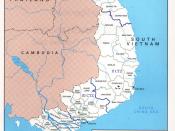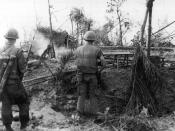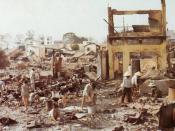The Tet Offensive
The American government had been telling their people that the communists were weakening and that they were now largely in control. What they saw through their television sets of the Tet Offensive contradicted this propaganda.
Fifty million watched as the ARVN killed prisoners, innocent civilians, and South Vietnam was bombed. The US government was now unable to portray the war as clean, simple, and easily won as the media in South Vietnam had unlimited access and graphic coverage.
"Dead bodies lay amid the rubble and rattle of automatic gunfire as dazed American soldiers and civilians run back and forth, trying to flush out the assailants. Americans at home saw the carnage wrought by the offensive." - Stanley Karnow.
As a direct result of these brutal displays, protests against the war greatly increased. Now, when the US government reported that the communists were weakening (which was the truth), few believed as they had been lied to earlier.
The largest demonstrations were held on April 24, 1971. In San Francisco about 300,000 people gathered, in Washington between 500,000 and 750,000. These were probably the biggest political demonstrations in the history of the United States.
The Vietnamese viewed these protests as a bad sign. Rumors began to spread through the south that the American's were about to sell off South Vietnam to the communist blocks. Some even went as far as believing that it was the US that assisted the communists in attacking the cities in South Vietnam. In the military, these rumors dealt deadly blows on the soldiers' morale. Their impacts still lingered on until the last days of April 1975.
The president of America at the time, Lyndon Johnson, also suffered as a result of the Tet Offensive. When he came into power in 1963 his approval rating...


